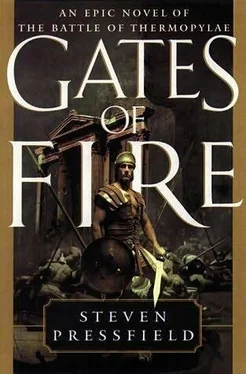Steven Pressfield - Gates of Fire - An Epic Novel of the Battle of Thermopylae
Здесь есть возможность читать онлайн «Steven Pressfield - Gates of Fire - An Epic Novel of the Battle of Thermopylae» весь текст электронной книги совершенно бесплатно (целиком полную версию без сокращений). В некоторых случаях можно слушать аудио, скачать через торрент в формате fb2 и присутствует краткое содержание. Жанр: Историческая проза, на английском языке. Описание произведения, (предисловие) а так же отзывы посетителей доступны на портале библиотеки ЛибКат.
- Название:Gates of Fire: An Epic Novel of the Battle of Thermopylae
- Автор:
- Жанр:
- Год:неизвестен
- ISBN:нет данных
- Рейтинг книги:3 / 5. Голосов: 1
-
Избранное:Добавить в избранное
- Отзывы:
-
Ваша оценка:
- 60
- 1
- 2
- 3
- 4
- 5
Gates of Fire: An Epic Novel of the Battle of Thermopylae: краткое содержание, описание и аннотация
Предлагаем к чтению аннотацию, описание, краткое содержание или предисловие (зависит от того, что написал сам автор книги «Gates of Fire: An Epic Novel of the Battle of Thermopylae»). Если вы не нашли необходимую информацию о книге — напишите в комментариях, мы постараемся отыскать её.
Gates of Fire: An Epic Novel of the Battle of Thermopylae — читать онлайн бесплатно полную книгу (весь текст) целиком
Ниже представлен текст книги, разбитый по страницам. Система сохранения места последней прочитанной страницы, позволяет с удобством читать онлайн бесплатно книгу «Gates of Fire: An Epic Novel of the Battle of Thermopylae», без необходимости каждый раз заново искать на чём Вы остановились. Поставьте закладку, и сможете в любой момент перейти на страницу, на которой закончили чтение.
Интервал:
Закладка:
At last we stood before the temple. It was nothing but a common house, perhaps home in former times to a middling-prosperous trader or merchant, sited upon a surprisingly cheerful slope two streets above the water. A copse of olives sheltered a walled enclave whose inner precinct could not be glimpsed from the street. I rapped at the gate; after an interval a priestess, if such a lofty title may be applied to a gowned and masked housewoman of fifty years, responded. She informed us the sanctuary was that of Demeter and Covert Kore, Persephone of the Veil. None but females might enter. Behind the shroud which concealed her face, the priestess was clearly frightened, nor could one blame her, the streets running with whoremongers and cutpurses. She would not let us in. No avenue of appeal proved of avail; the woman would neither confirm my cousin's presence nor agree to convey a message within. Again my boy guide took the bull by the horns. He opened his cheesepipe and bawled Diomache's name.
We were admitted at last to a rear courtyard, the lad and I. The house upon entry proved far more capacious, and a good deal cheerier, than it had appeared from the street. We were not permitted passage through the interior but escorted along an outer path. The dame, our chaperon, confirmed that a matron by name Diomache was indeed among those novices currently resident within the sanctuary. She was at this hour attending to duties in the kitchen; an interview, however, of a few minutes' duration might be granted, with permission from the asylum mother. My guide, the boy, was offered refreshment; the dame took him away for a feed.
I was standing, alone in the courtyard, when my cousin entered. Her children, both girls, one perhaps five, the other a year or two older, clung fearfully to her skirts; they would not come forward when I knelt and held out my hand. Forgive them, my cousin said. They are shy of men. The dame led the girls away to the interior, leaving me at last alone with Diomache.
How many times in imagination had I rehearsed this moment. Always in conjured scenarios, my cousin was young and beautiful; I ran to her arms and she to mine. Nothing of the sort now occurred. Diomache stepped into view in the lamplight, garbed in black, with the entire breadth of the court dividing us. The shock of her appearance unstrung me. She was unveiled and unhooded. Her hair was cropped short. Her years were no more than twenty-four yet she looked forty, and a hard-used forty at that.
Can it really be you, cousin? she inquired in the same teasing voice she had taken with me since we were children. You are a man, as you were always so impatient to become.
Her lightness of tone served only to compound the despair which now seized my heart. The picture I had held so long before the eye of the mind was of her in the bloom of youth, womanly and strong, exactly as she had been the morning we parted at the Three-Cornered Way. What terrible hardships had been visited upon her by the intervening years? The vision of the whoreinfested streets was fresh upon me, the crude seamen and the mean existence of these refusechoked lanes. I sank, overcome with grief and regret, upon a bench along the wall.
I should never have left you, I said, and meant it with all my heart. Everything that has happened is my fault for not being at your side to defend you.
I cannot recall a word of what was spoken over the next several minutes. I remember my cousin moving to the bench beside me. She did not embrace me, but touched me with tender clemency upon the shoulder.
Do you remember that morning, Xeo, when we set out for market with Stumblefoot and your little clutch of ptarmigan eggs? Her lips declined into a sorrowful smile. The gods set our lives upon their courses that day. Courses from which neither of us has had the option to stray.
She asked if I would take wine. A bowl was brought. I recalled the letter I bore and delivered it now to my cousin.
Beneath its wrapper, it was addressed to her, not her hus-band; she opened and read it. Its contents were in the lady Arete's hand. When Diomache finished she did not show it to me, but tucked it away without a word beneath her robe. My eyes, adjusted now to the lamplight of the court, studied my cousin's face. Her beauty remained, I saw, but altered in a manner both grave and austere. The age in her eyes, which had at first shocked and repelled me, I now perceived as compassion and even wisdom. Her silence was profound as the lady Arete's; her bearing spartan beyond spartan. I was daunted and even in awe. She seemed, like the goddess she served, a maiden hauled off untimely by the dark forces of the underworld and now, restored by some covenant with those pitiless gods, bearing in her eyes that primal female wisdom which is simultaneously human and inhuman, personal and impersonal. Love for her flooded my heart.
Yet did she appear, inches from my grasp, as august as an immortal and as impossible to hold.
Do you feel the city about us now? she asked. Outside the walls, the rumble of evacuees and their baggage trains could clearly be heard. It's like that morning at Astakos, isn't it? Perhaps within weeks this mighty city will be fired and razed, as our own was on that day.
I begged her to tell me how she was. Truly. She laughed.
I've changed, haven't I? Not the husband bait you always took me for. I was foolish then too; I thought as highly of my prospects. But this is not a woman's world, cousin. It never was and never will be.
From my lips blurted a course of passionate impulse. She must come with me. Now. To the hills, where we had flown once and been happy once. I would be her husband. She would be my wife.
Nothing would ever harm her again.
My sweet cousin, she replied with tender resignation, I have a husband. She indicated the letter. As you have a wife.
Her seemingly passive acceptance of fate infuriated me. What husband is he who abandons his wife? What wife is she taken without love? The gods demand of us action and the use of our free will! That is piety, not to buckle beneath necessity's yoke like dumb beasts!
This is Lord Apollo talking. My cousin smiled and touched me again with patient gentleness.
She asked if she could tell me a story. Would I listen? It was a tale she had confided to no one, save her sisters of the sanctuary and our dearest friend Bruxieus. Only a few minutes remained to us. I must be patient and attend.
Do you remember that day when the Argive soldiers shamed me? You knew I turned the hands of murder upon the issue of that violation. I aborted myself. But what you didn't know was that I hemorrhaged one night and nearly died. Bruxieus saved me as you slept. I bound him by oath never to tell you.
She regarded me with the same self-consecrated gaze I had observed upon the features of the lady Arete, that expression born of feminine wisdom which apprehends truth directly, through the blood, unobscured by the cruder faculty of reason. Like you, cousin, I hated life then. I wanted to die, and nearly did. That night in fevered sleep, feeling the blood draining from me like oil from an overturned lamp, I had a dream.
A goddess stood above me, veiled and cowled. I could see nothing but her eyes, yet so vivid was her presence that I felt certain she was real. More real than real, as if life itself were the dream and this, the dream, life in its profoundest essence. The goddess spoke no words but merely looked upon me with eyes of supreme wisdom and compassion.
My soul ached with the desire to behold her face. I was consumed with this need and implored her, in words that were not words but only the fervent appeal of my heart, to loose her veil and let me see the whole of her. I knew without thought that what would be revealed would be of supreme consequence. I was terrified and at the same time trembling with anticipation.
Читать дальшеИнтервал:
Закладка:
Похожие книги на «Gates of Fire: An Epic Novel of the Battle of Thermopylae»
Представляем Вашему вниманию похожие книги на «Gates of Fire: An Epic Novel of the Battle of Thermopylae» списком для выбора. Мы отобрали схожую по названию и смыслу литературу в надежде предоставить читателям больше вариантов отыскать новые, интересные, ещё непрочитанные произведения.
Обсуждение, отзывы о книге «Gates of Fire: An Epic Novel of the Battle of Thermopylae» и просто собственные мнения читателей. Оставьте ваши комментарии, напишите, что Вы думаете о произведении, его смысле или главных героях. Укажите что конкретно понравилось, а что нет, и почему Вы так считаете.












